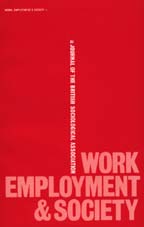Crossref Citations
This article has been cited by the following publications. This list is generated based on data provided by
Crossref.
Buckingham, Christopher D.
and
Adams, Ann
2000.
Classifying clinical decision making: a unifying approach.
Journal of Advanced Nursing,
Vol. 32,
Issue. 4,
p.
981.
Adams, Ann
and
Bond, Senga
2000.
Hospital nurses’ job satisfaction, individual and organizational characteristics.
Journal of Advanced Nursing,
Vol. 32,
Issue. 3,
p.
536.
Carter, Bob
Davies, Steven
and
Fairbrother, Peter
2002.
The Rise and Rise of Market Relations in the British Public Sector: Implications for Industrial Relations.
The Economic and Labour Relations Review,
Vol. 13,
Issue. 1,
p.
36.
Beil‐Hildebrand, Margitta B.
2002.
Theorising culture and culture in context: institutional excellence and control.
Nursing Inquiry,
Vol. 9,
Issue. 4,
p.
257.
McKenna, Hugh
Keeney, Sinead
and
Bradley, Martin
2003.
Generic and specialist nursing roles in the community: an investigation of professional and lay views.
Health & Social Care in the Community,
Vol. 11,
Issue. 6,
p.
537.
Bolton, Sharon C.
2004.
A Simple Matter of Control? NHS Hospital Nurses and New Management*.
Journal of Management Studies,
Vol. 41,
Issue. 2,
p.
317.
Sibbald, Bonnie
Shen, Jie
and
Mcbride, Anne
2004.
Changing the skill-mix of the health care workforce.
Journal of Health Services Research & Policy,
Vol. 9,
Issue. 1_suppl,
p.
28.
Green, Francis
2004.
Why Has Work Effort Become More Intense?.
Industrial Relations: A Journal of Economy and Society,
Vol. 43,
Issue. 4,
p.
709.
McKenna, Hugh
and
Keeney, Sinead
2004.
Community nursing: health professional and public perceptions.
Journal of Advanced Nursing,
Vol. 48,
Issue. 1,
p.
17.
Edwards, Christine
and
Robinson, Olive
2004.
Evaluating the Business Case for Part‐time Working amongst Qualified Nurses.
British Journal of Industrial Relations,
Vol. 42,
Issue. 1,
p.
167.
Ryan, Helen
Cadman, Catherine
and
Hann, Linda
2004.
Setting standards for assessment of ward patients at risk of deterioration.
British Journal of Nursing,
Vol. 13,
Issue. 20,
p.
1186.
Lewis, Patricia
2005.
Suppression or expression.
Work, Employment and Society,
Vol. 19,
Issue. 3,
p.
565.
Butterfield, Reginald
Edwards, Christine
and
Woodall, Jean
2005.
The New Public Management and Managerial Roles: the Case of the Police Sergeant.
British Journal of Management,
Vol. 16,
Issue. 4,
p.
329.
Cooke, Hannah
2006.
Seagull management and the control of nursing work.
Work, Employment and Society,
Vol. 20,
Issue. 2,
p.
223.
Sibbald, Bonnie
Laurant, Miranda G
and
Reeves, David
2006.
Advanced nurse roles in UK primary care.
Medical Journal of Australia,
Vol. 185,
Issue. 1,
p.
10.
Rhéaume, Ann
Dykeman, Margaret
Davidson, Patricia
and
Ericson, Penny
2007.
The Impact of Health Care Restructuring and Baccalaureate Entry to Practice on Nurses in New Brunswick.
Policy, Politics, & Nursing Practice,
Vol. 8,
Issue. 2,
p.
130.
Maben, Jill
Latter, Sue
and
Clark, Jill Macleod
2007.
The sustainability of ideals, values and the nursing mandate: evidence from a longitudinal qualitative study.
Nursing Inquiry,
Vol. 14,
Issue. 2,
p.
99.
Windsor, Carol
2007.
Technology and Nursing.
p.
146.
Aranda, Kay
and
Law, Kate
2007.
Tales of sociology and the nursing curriculum: Revisiting the debates.
Nurse Education Today,
Vol. 27,
Issue. 6,
p.
561.
Erickson, Rebecca J.
and
Grove, Wendy J. C.
2008.
Emotional Labor and Health Care.
Sociology Compass,
Vol. 2,
Issue. 2,
p.
704.




